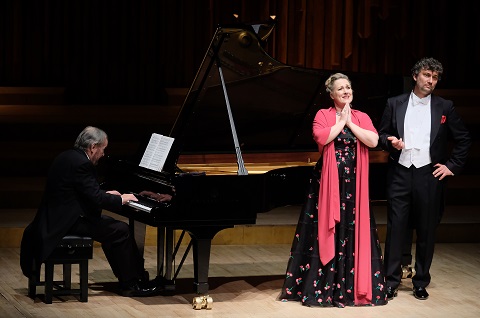Wolf, one might say, was an Austrian composer, which is or at least was
certainly to say also a German composer; yet he was born in Windischgrätz,
now Slovenj Gradec. Both names for what was long a Styrian town refer to
the Slovene or Wendish Graz, to distinguish it from the larger Graz. And so
on, and so forth. Mitteleuropaïsch is more than a collection of
disparate identities; it is an identity in itself. It certainly was in the
Austrian Empire in which Wolf was born, and it certainly was in the Dual
Monarchy in which he grew up. Moreover, northern Italy had long been part,
to varying extents, and depending on who was, of that identity too. So too,
however, had a romanticised German idea of ‘Italy’, of the Mediterranean,
of the South. Look to Goethe and Liszt, for instance - or to Paul Heyse’s
selection and translations of songs, as set by Wolf (not greatly, or indeed
at all, to Heyse’s pleasure).
What one can say is that this idealised ‘Italy’, Tuscan rispetti
and Venetian vilote could only have come from without the Italian
lands. If ‘German’ constitutes at least as multifarious a multitude of sins
as ‘Italian’, these songs remain very much a German evocation of lightness,
of sunlight, of serenades, of a ‘love’ that is rarely, if ever that of
German Romanticism, although it may well be viewed through that prism. All
three performers at this Barbican recital understood that, I think: both
intuitively and intellectually. At any rate, the tricky balance between
Italian ‘light’, in more than one sense, and German ‘prism’ seemed almost
effortlessly communicated - however much art had been required to convey
such an impression.
The songbook is not a song-cycle, so to speak of ‘reordering’ is perhaps
slightly misleading. At any rate, the ordering selected made good sense,
grouping the book’s forty-six little songs into four groups, which, if not
exactly narratives of their own, made sense as scenes or, if you will,
scenas. One made connections as and when one wished; nothing was forced,
much as in the music and the performances themselves. Diana Damrau and
Jonas Kaufmann opted, boldly yet not too boldly, for a staginess alive to
the humour, or at least to the potential for humour without sending
anything up or otherwise trying to turn the songs into something they are
not. Helmut Deutsch, in general the straight man, perhaps had the ultimate
moment of humour, in his piano evocation of a hapless violinist (‘Wie lange
schon war immer mien Verlangen), Damrau having ambiguously prepared the
way, at least in retrospect, with a lightly wienerisch account.
Deutsch provided an excellent sense of structure throughout:
non-interventionist perhaps, but none the worse for that. Damrau and
Kaufmann, after all, were intended to be the ‘stars’ here.
In general, but only in general, Damrau’s performances - roughly
alternating, yet with a few exceptions - were knowing, whilst Kaufmann’s
were lovelorn. Such is the order of things in this ‘German Italy’.
Metaphysics, when they reared their head - more in Wolf than in Heyse -
tended to be the tenor’s. Was he right to make relatively little of them? I
am not sure that right or wrong makes much sense here. Perhaps it is all,
or mostly, in inverted commas anyway. There were a few occasions when I
found Kaufmann, especially during the first half, somewhat generalised, but
such generality remains a very superior form: more baritonal still than I
can recall having heard him, yet with an ardent, show-stopping tenor, even
upper-case Tenor, that puts one in mind, just in time, of his Walther (‘Ihr
seid die Allerschönste’) or his Bacchus (‘Nicht länger kann ich singen’).
And Damrau was perfectly capable of responding, of singing about his
singing, as for instance, in ‘Mein Liebster singt am Haus’, to which
Kaufmann’s ‘Ein Ständchen Euch zu bringen’ came as the perfect response,
and so on. Piano and voice together in the latter song conveyed to near
perfection the shallow yet genuine sexual impetuosity of youth. (Or is that
just what older people think?) The lightness of a wastrel’s self-pity in ‘O
wüsstest du, wie viel ich deinetwegen,’ was likewise finely judged. So too
was the cruelty of his beloved in ‘Du denkst mit einem Fädchen’.
Yet, as the two archetypes, stereotypes, call them what you will, drew
closer towards the end of the first half, there was genuine affection too,
or so one thought. The rocking piano in ‘Nun lass uns Frieden schliessen’
suggested, without unnecessary underlining, a peace perhaps all the more
interesting, or at least characteristic, for its lack of interest in
passing all understanding. For, as that half had climaxed with an
acknowledged role for Wolf’s Lisztian Romantic inheritance, so the piano
harmonies of the second half took up from that half-destination, taking us
somewhere new, briefly darker (the austere Doppelgänger flirtation
of ‘Wir haben beide lange Zeit geschweiegen’) and ultimately, once again,
‘lighter’, yet perhaps never truly ‘light’. Sweetness of death (‘Sterb’
ich, so hüllt in Blumen meine Glieder’) intervened, yet was it but an act,
the commedia dell’arte perhaps, or, as the Marschallin would soon
have it, ‘eine wienerische Maskerad[e]’. Increasingly, neither party wished
truly to resist, whilst making great play of doing so: on stage as well as
in music. An air of Straussian sophistication became more marked, without
ever shading into mere cynicism. If the ‘girl’ were always going to win,
that was as it ‘should’ be. There were enough qualifications, or potential
alternative paths and readings, though, to make one wonder. And then to
wonder - ‘lightly’ or no - why one was wondering at all.
Mark Berry
Diana Damrau (soprano), Jonas Kaufmann (tenor), Helmut Deutsch (piano).
Barbican Hall, London; Friday 16 February 2018.
